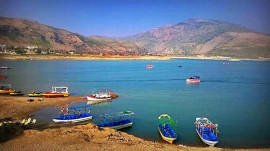
Following the Lahore High Court’s (LHC’s) orders to the federal government to start construction of the contentious Kalabagh Dam, the ministry of water and power told the LHC on Friday that the project was viable and the federal government had been struggling to build a consensus on the issue.
Representing the ministry and the Water and Power Development Authority, Advocate Khwaja Tariq Rahim stated that during the regime of former president Farooq Ahmad Khan Leghari, technicalities of the project were finalised, but the construction of Kalabagh Dam could not be started.
Advocate Rahim had appeared before the bench, headed by Chief Justice Umar Ata Bandial in connection with a petition filed by Judicial Activism Panel Chairman Muhammad Azhar Siddique, among others, against unscheduled load-shedding and an exemption from power cuts to VVIPs in the country.
He told the court that in light of the decisions by the Council of Common Interests, 350 megawatts of power was withdrawn from the Karachi Electric Supply Corporation and added to the national grid. He said that following this, load-shedding had reduced in the country.

He pointed out that out of a total of 21 million electricity consumers across the country, 2 million consumed less than 100 units a month.
The counsel said that smart metres could be installed to supply uninterrupted electricity to consumers of below 300 units per month, but it would require sizeable financing. Advocate Rahim added that the government was already providing a subsidy of Rs250 billion on electricity tariffs.
Siddique pointed out that in India, electricity was free-of-cost for agricultural purposes. However, in Pakistan, tube wells were not provided with free electricity, nor were they exempt from load-shedding.
CJ Bandial observed that the agriculture sector was the backbone of the country’s economy. He asked Advocate Rahim whether the court should order the government to exempt tube wells from power outages. Advocate Rahim, however, stated that this was not possible as separate electricity feeders would be required for the purpose.
The chief justice remarked that commercial consumers who were willing to buy electricity on inflated tariffs could be exempted from load-shedding.
Siddique said in other provinces, electricity theft was happening on a large scale, yet Punjab was being victimised in the electricity load management plan. He pointed out that power production was being affected due to the non-recovery of electricity bills from the other provinces.
Published in The Express Tribune, December 1st, 2012.
COMMENTS (1)
Comments are moderated and generally will be posted if they are on-topic and not abusive.
For more information, please see our Comments FAQ










1732012115-0/Untitled-design-(14)1732012115-0-270x192.webp)






Can someone tell us why consensus could not be reached.